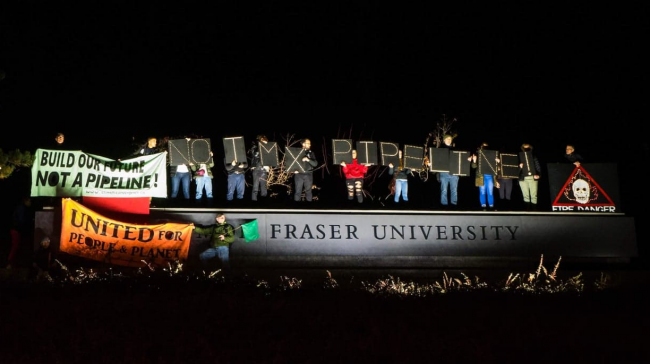Articles Menu

September 18th 2020
With the Liberal government’s throne speech days away, groups representing 180,000 post-secondary students are asking Prime Minister Justin Trudeau to abandon the Trans Mountain pipeline expansion project.
In an open letter signed by student unions from schools in Canada and the United States, the youth urged Trudeau to invest in Indigenous-led green infrastructure instead of pipelines. The letter comes as the government appears to back off from its initially lofty promises of a green recovery.
“We want Justin Trudeau and the federal government to commit to the green economy principles they promised us, and the climate action that they promised (in the last federal election),” said Christina Kachkarova, 21, a spokesperson for Justice, No Pipeline, a Simon Fraser University-based student group that organized the campaign.
“We want to know that we will have a safe future.”
Justice, No Pipeline is a subgroup of SFU350, a university club that’s connected to international environmental organization 350.org. Simon Fraser University is in Burnaby, B.C., near the endpoint of the Trans Mountain pipeline.
The open letter was backed by a litany of Indigenous, environmental and advocacy groups on both sides of the border. Kachkarova said American student groups chose to sign on because much of the oil flowing through Trans Mountain is bound for refineries in Washington state.
The Trudeau government bought Trans Mountain and the expansion project (TMX) in 2018. In the letter, the students said they are concerned about the project’s impacts on carbon emissions, opposition to the project from First Nations whose traditional territory it would run through, the risk of spills off the coast of B.C., impacts on marine wildlife and estimates that it could take hours for firefighting equipment to reach a Trans Mountain tank farm on Burnaby Mountain.
“We call on the federal government to direct funds towards green job-retraining initiatives,” the letter reads.
“It is not only workers who are directly involved in the fossil fuel industry who struggle in the wake of the downturn in oil markets, but those who are involved indirectly, many of whom belong to marginalized groups.”
The letter also pointed to questions about whether the pipeline will be profitable, and whether it’s a good investment at a time when the world is increasingly shifting away from fossil fuels.
“Is the federal government ready to accept responsibility for putting the safety of thousands of people at risk, including those of young children, for a dirty pipeline that is not only unprofitable, but that counteracts efforts to mitigate climate change?”
In an open letter, students urged Trudeau to invest in Indigenous-led green infrastructure instead of pipelines. The campaign comes as the government appears to back off from its initial lofty promises of a green recovery. #cdnpoli
The open letter comes at a time when everyone from provinces and lobbyists to chambers of commerce to environmentalists are doing their best to sway the government ahead of the throne speech.
The throne speech will happen on Sept. 23. In it, the Liberal government is expected to outline its plans for the continuing economic and health crisis caused by COVID-19.
The speech also prompts a confidence vote. Since the Trudeau government holds a minority of seats, it must win the support of at least one major opposition party to avoid an early election.
When the prime minister prorogued Parliament last month, setting the date for the throne speech, he hinted at plans to fund green infrastructure as a way to help Canada’s economic recovery from shutdowns caused by COVID-19.
“This is our chance to build a more resilient Canada, a Canada that is healthier and safer, greener and more competitive, a Canada that is more welcoming and more fair," Trudeau said at the time.
The government’s tone has also shifted, with ministers saying COVID-19 is top priority.
“First and foremost, we have to be sure that we’re doing the things with our provincial and territorial counterparts to try to stem the rise and to ensure that Canadians will be safe,” Environment Minister Jonathan Wilkinson told reporters Wednesday.
“That being said, what the throne speech is intended to do is to outline sort of the broad parameters and the themes that will be important for the government over the course of the coming session of Parliament. Certainly in that context, the work to address the climate crisis is very important.”
Kachkarova said the climate crisis remains urgent.
“I guess it’s a little disappointing to hear, given that Canada is warming at twice the rate of the rest of the world,” she said, referring to the government’s rhetoric.
“It’s concerning to see how these policy changes and what they want to invest in will affect us long into the future.”
In a statement, Ian Cameron, a spokesperson for Natural Resources Minister Seamus O’Regan, pointed to investments the government has made this year to clean up aging wells in Western Canada and reduce emissions from oil and gas. He also pointed to investments in programs aimed at helping Indigenous communities use less diesel power, and to increase energy efficiency across Canada.
“Lastly, we will use the revenues from TMX — a project that is creating good, middle-class jobs today — to invest in a clean economy that will create jobs and attract investment,” Cameron said.
“We’re going to continue to work with our natural resource sectors and all sectors of the economy to build back better, cleaner and more resilient."
Emma McIntosh / Local Journalism Initiative / Canada’s National Observer
[Top photo: Students at Simon Fraser University protest the Trans Mountain pipeline expansion in fall 2019, before COVID-19. Photo courtesy Justice, No Pipeline]